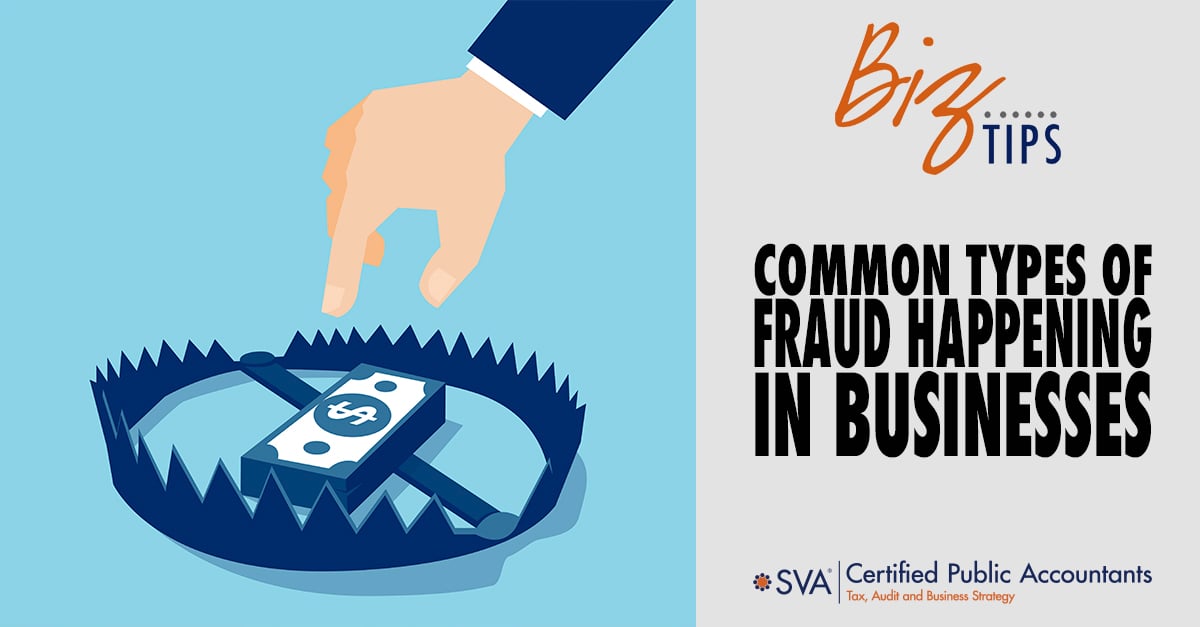Fraud is not uncommon in business. In fact, it happens to companies more than they know (or want to know!).
Ignoring the problem won’t make it go away, so why not learn more about the different types of fraud that are affecting your business?
Here are five common types of fraud that occur in businesses every day. Some are conducted by employees, some by customers, and some by a combination of the two.

5 Common Types of Fraud Businesses Should Look For
1. Data/Intellectual Theft
Every business has competitors. The competitiveness in some industries is cut-throat and unsavory tactics are used to gain an edge on others. Instead of going through the process of developing new products or services, some companies resort to stealing information from other businesses that have the knowledge they are looking for.
Data or intellectual theft occurs when an employee is recruited by another company to steal data and information from their parent company. Why spend time and money doing it yourself when you can steal it, right?
How to Prevent: Keep a tight lid on your valuable data and company secrets. Only allow necessary people access to this information and create a “need-to-know” mentality. Non-Disclosure Agreements (NDA) should be required of all employees with access to your intellectual data.
2. Payroll Fraud
There are different ways in which payroll fraud can be committed:
- Employees can lie about their hours to get paid more.
- Sales numbers can be inflated to achieve quotas/bonuses.
- Co-workers clocking an employee in and out for a shift(s) they didn’t work.
Studies have shown that this type of fraud affects businesses more frequently as they usually don’t have policies or measures in place to monitor these scenarios.
How to Prevent: Set up a timekeeping system that involves a biometric such as a fingerprint to clock in and out and software to track hours. This would help prevent employees from lying about their hours and also from clocking in and out for other employees. Develop redundant sales monitoring systems that will double-check sales numbers to verify accuracy. This may involve software or using humans to ensure sales reporting is correct.
3. Money Fraud
No person or business likes to be duped, but that is exactly what money fraud is. Criminals use fake bills to purchase products or services. Unless bills are checked regularly, you won’t know you’ve been a victim of money fraud until it is too late.
How to Prevent: Specially made markers/pens are available at most office supply stores that can detect fraudulent money. Simply use the marker/pen on the bill and the color of the mark will indicate if the bill is real or not. It’s not uncommon to see stores use these pens during a transaction, especially for larger bills.
(Download Video Transcript)
4. Return Fraud
A return or exchange policy for purchased goods is common among retail businesses. If not closely monitored, this can open the company up to return fraud. Some examples of return fraud are:
- People returning stolen goods.
- Using an item until the return deadline, then returning for a refund.
- Lying about a purchase and returning without a receipt to receive cash back.
How to Prevent: Establish a simple return policy. For example, a customer must have a receipt to return a product and instead of issuing a cash return, give them store credit. This should prevent most fraudulent returns and reduce the impact on your business.
5. Workers' Compensation Fraud
What’s an easy way for an employee to get paid without doing any or little work? By faking or overstating an injury in order to get Workers’ Compensation payments. This type of fraud isn’t as cut and dry as some of the others. If a coworker falls at work, can you tell them how much pain they are in? No, it’s not reasonable to believe one person can tell another person they aren’t hurt that bad.
How to Prevent: For this type of fraud, make sure all Workers’ Compensation forms are filled out correctly and that the employee has sought medical attention/advice from a professional. Due diligence regarding paperwork and a formal process will help weed out fraudulent claims.
Make Fraud a Thing of the Past
Knowing what types of fraud to look for will help you take the necessary steps to prevent them from damaging your business. The time and costs to implement policies to prevent fraud is far outweighed by the cost of fraud to your bottom line.

© 2021 SVA Certified Public Accountants

